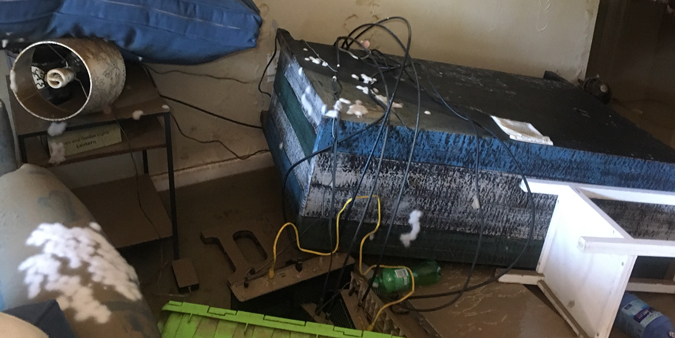 Flooding from Hurricane Harvey destroyed Dupaco Community Credit Union member Samantha Hermsen’s first-floor Houston apartment, leaving her with next to nothing. That’s when Hermsen called on her hometown credit union, which turned sympathy into action and helped her get back on her feet again. Over phone and email, Dupaco’s Tammy Wood helped Hermsen get an auto loan so she could trade in her car for a larger one as she prepared for the next chapter.
Flooding from Hurricane Harvey destroyed Dupaco Community Credit Union member Samantha Hermsen’s first-floor Houston apartment, leaving her with next to nothing. That’s when Hermsen called on her hometown credit union, which turned sympathy into action and helped her get back on her feet again. Over phone and email, Dupaco’s Tammy Wood helped Hermsen get an auto loan so she could trade in her car for a larger one as she prepared for the next chapter.
What homeowners should know about flooding
Did you know flooding is the nation’s most common—and costly—natural disaster?
“Until somebody sees this can actually happen, they don’t always realize it can,” said Tim Bemis, insurance services regional manager at Dupaco Insurance Services.
The Federal Emergency Management Agency, which administers the National Flood Insurance Program, reports:
- Floods are the nation’s most common and costly natural disaster, causing millions of dollars in damage each year.
- Homeowners and renters insurance don’t typically cover flood damage.
- Just 1 inch of water can cause $25,000 of damage to your home.
If your home takes on water, here’s a look at the steps you should take, and some tips to help protect your home against flooding in the future:
What to do if your basement floods
Take pictures
Take photos before you start removing water. Also take photos during the cleanup process to document the damage for your insurance provider.
Move it out
Get the water and any wet possessions out of there as fast as possible.
“Once stuff is wet, it can start to mold and mildew very quickly,” Bemis said.
Practice safety
Kill power to the basement before entering the water. And be careful with exposure to the water, which could contain any number of unknown substances.
Call your insurance agent
Find out whether your insurance company will cover any of the damage.
“Worst case scenario is they’re going to tell you that you don’t have any kind of coverage. But let them be the ones to tell you that,” Bemis said.
Save receipts
Hold onto any receipts related to the damage, including:
Your insurance provider might reimburse you for some of those items.
Prevent future flooding damage
These steps can help protect your home from flooding damage in the future:
Review your homeowners policy
If you have a sump pump or floor drains in your basement, consider adding water-sewer backup coverage to your homeowners policy.
It will help cover those times when:
- Your sump pump fails to do its job.
- A power outage prevents your sump pump from running.
- Water or sewage enters your home through your floor drains.
But remember: No homeowner’s policy covers floods or ground water seepage that enters through cracks in foundation walls and floors.
Ask about flood insurance
Ask your agent whether you qualify for flood insurance through the National Flood Insurance Program.
“Many people don’t believe they can get flood insurance unless they are in a flood zone,” Bemis said. “The truth is, everyone is in a flood zone. FEMA flood maps incorporate all areas and then assign a risk factor.”
While high-risk areas tend to be what most consider “flood zones,” the less risky zones get preferential rates.
See the flood history of your county with FEMA’s interactive data visualization tool >
“People don’t believe they are at risk because they don’t live near water. But about one in five flood claims come from outside the high-risk zones and account for a third of all disaster assistance,” Bemis said.
Clean gutters and downspouts
A couple of times each year—in the spring and fall—make sure your gutters and downspouts are free of debris and secured appropriately.
Check your sump pump
Periodically check to make sure your sump pump is working by testing it with a bucket of water. Ideally, the sump pump should be on its own circuit and not run through an extension cord.
Practice smart landscaping
Keep landscaping sloped away from the house.
Store possessions properly
Keep belongings in your basement elevated and away from areas known to take on moisture.



